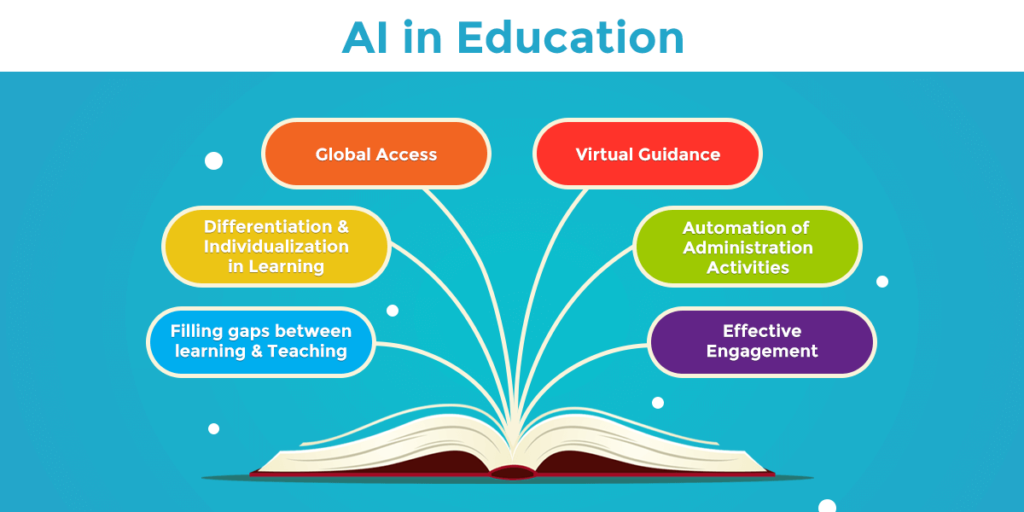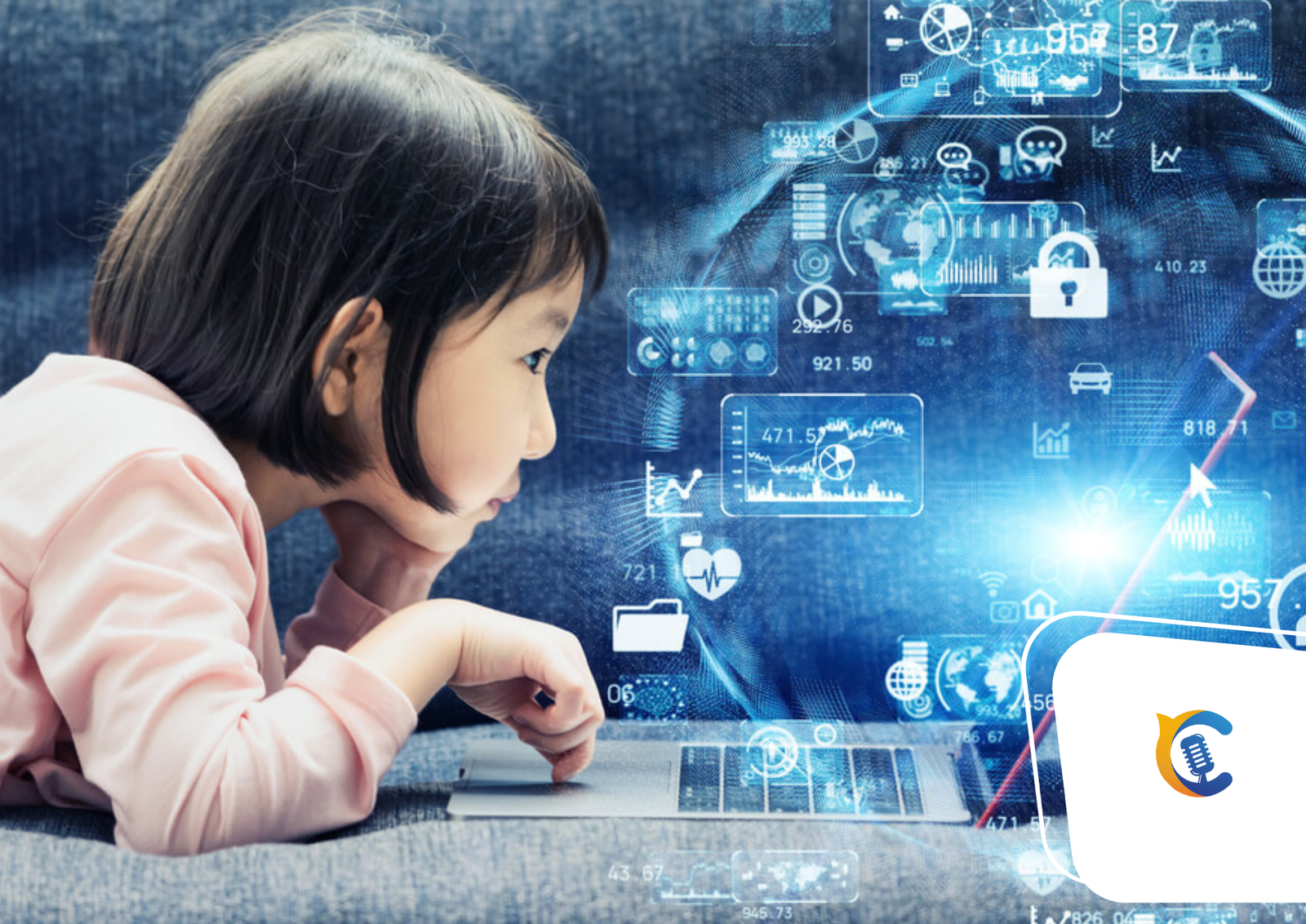Artificial Intelligence / AI / AI in Education / AI in Education 2023
Table of Contents
Introduction

The incorporation of Artificial Intelligence (AI) in education has emerged as a transformative trend, revolutionizing conventional teaching and learning methods. The potential of AI to personalize learning experiences, provide timely automated feedback, and optimize educational outcomes has led to its widespread adoption in classrooms and educational institutions globally. In this blog, we will explore how AI is reshaping the educational landscape, creating more effective and engaging learning environments for students and educators alike.
Personalized Learning with AI

One of the most significant advantages of integrating AI in education is its capacity to personalize learning experiences for students. Each learner possesses unique strengths, weaknesses, and preferred learning styles. AI algorithms can analyze extensive data, including student performance, behavior, and preferences, to create personalized learning paths tailored to individual needs.
Adaptive learning platforms, empowered by AI, can adjust the difficulty and pace of educational content based on each student’s proficiency level. This ensures that students are appropriately challenged, preventing feelings of overwhelm or disengagement. By catering to individual learning preferences, AI-driven systems can boost motivation, foster a deeper understanding of concepts, and enhance overall academic performance.
Automated Feedback and Assessment

Traditionally, providing timely feedback and grading assessments has been a time-consuming task for educators. AI streamlines this process by automating feedback and assessment mechanisms. Through natural language processing (NLP) and machine learning algorithms, AI can evaluate and grade assignments, essays, and quizzes with remarkable accuracy.
Automated feedback offers several benefits to both students and teachers. Students receive instant feedback, identifying areas of improvement and understanding their mistakes. On the other hand, teachers save valuable time on grading and gain deeper insights into student progress, enabling them to focus on more personalized and effective teaching strategies.
Enhancing Educational Outcomes

AI’s integration in education goes beyond personalization and feedback; it also plays a pivotal role in enhancing overall educational outcomes. AI-powered analytics can analyze vast datasets to identify patterns and trends related to student performance, engagement, and achievement.
These insights empower educators and administrators to make data-driven decisions and implement evidence-based interventions. For instance, identifying struggling students early on allows educators to provide targeted support and prevent learning gaps from widening. Similarly, AI-driven analytics help refine curricula and teaching methods, optimizing the learning process to achieve better results.
Facilitating Teachers and Promoting Professional Development

Contrary to common misconceptions, AI in education is not aimed at replacing teachers; instead, it serves as a valuable tool to support and empower educators. AI-driven tools can assist teachers in creating customized lesson plans, suggesting supplementary materials, and offering innovative teaching techniques.
Moreover, AI helps automate administrative tasks, such as scheduling, grading, and record-keeping, allowing teachers to concentrate more on their core teaching responsibilities and fostering meaningful student-teacher interactions.
AI also promotes teachers’ professional development by offering insights into their teaching effectiveness. Through AI-powered classroom observations and feedback, educators can gain valuable input to refine their pedagogical approaches continuously.
Addressing Educational Inequities

Another significant advantage of AI in education is its potential to address educational inequities. Not all students have access to the same resources or opportunities, leading to disparities in learning outcomes. AI can bridge this gap by providing personalized, adaptive learning experiences that cater to each student’s specific needs and abilities.
Additionally, AI-driven educational content can be made available online, breaking geographical barriers and reaching underserved communities worldwide. This democratization of education ensures that all students, regardless of their location or socio-economic background, have access to quality learning materials and experiences.
Overcoming Challenges and Ethical Considerations
As AI continues to transform education, it is crucial to address the challenges and ethical considerations that come with its integration. One major concern is the potential bias in AI algorithms. If not properly designed and trained, AI systems may inadvertently reinforce existing inequalities or stereotypes, leading to biased educational experiences. To mitigate this risk, developers and educators must prioritize diversity in the data used to train AI models and regularly monitor for any biases that may emerge.
Data privacy is another critical issue. As AI collects and analyzes vast amounts of student data, ensuring the privacy and security of this information becomes paramount. Educational institutions must adopt robust data protection measures and be transparent about how student data is used and stored.
Moreover, concerns about job displacement due to AI automation should not be overlooked. While AI can streamline administrative tasks, teachers’ roles will continue to be irreplaceable in providing emotional support, creativity, and critical thinking guidance. Emphasizing the collaborative potential of AI and teachers is essential to allay fears and foster a positive outlook on the future of education.
Embracing Lifelong Learning
AI’s integration in education also emphasizes the importance of lifelong learning for both students and educators. As AI continuously evolves, educators need to stay updated with the latest technological advancements and teaching methodologies. Professional development opportunities that focus on AI literacy and integration are essential to empower teachers to leverage AI effectively in the classroom.
For students, the prevalence of AI underscores the need to develop skills that complement AI capabilities. Emphasizing soft skills such as critical thinking, problem-solving, creativity, and emotional intelligence becomes even more crucial as AI takes over routine tasks. Students need to become adaptable and lifelong learners who can thrive in a rapidly changing technological landscape.
Future Prospects of AI in Education
The future prospects of AI in education are promising. As technology advances, AI will become more sophisticated in understanding and adapting to individual learning needs. Virtual reality and augmented reality technologies will likely be integrated with AI, providing immersive and interactive learning experiences.
AI-powered chatbots and virtual assistants will further enhance student support, offering 24/7 access to personalized help and resources. Additionally, AI-driven recommendation systems will continue to improve, suggesting personalized educational content and learning pathways based on students’ interests and goals.
Collaboration between edtech startups, researchers, educators, and policymakers will be crucial in harnessing the full potential of AI in education. By fostering an ecosystem of innovative and responsible AI use, we can build a future where AI serves as an indispensable tool in creating equitable and effective educational experiences for all.
AI in Education: key facts
- AI in education personalizes learning, automates feedback, and boosts educational outcomes.
- Integrating AI in education facilitates personalized learning paths.
- AI-driven feedback enhances student performance in education.
- AI-driven educational tools are gaining popularity for their efficiency.
- Personalized learning with AI optimizes student engagement.
- Automated feedback from AI streamlines the assessment process.
- AI-powered tutoring enhances individual student progress.
- AI analytics improves educational decision-making and resource allocation.
- AI-enabled virtual classrooms redefine the learning experience.
- The prevalence of AI in education signifies a transformative trend in the sector.
Conclusion
AI’s integration in education is a transformative trend that holds immense potential in personalizing learning experiences, automating feedback and assessments, and enhancing educational outcomes. By leveraging AI’s capabilities responsibly and ethically, we can overcome challenges and create a future where AI works hand in hand with educators, enriching the learning journey for every student.
The key to success lies in adopting AI as a complementary tool that empowers teachers, expands access to quality education, and equips students with the skills needed to thrive in a technology-driven world. As we embrace AI in education, we must ensure that it aligns with our goals of fostering creativity, critical thinking, and lifelong learning, preparing the next generation for the opportunities and challenges that lie ahead.
Read More: Artificial Intelligence / AI / AI in Education / AI in Education 2023


































